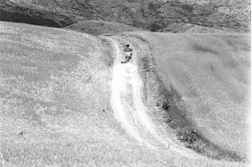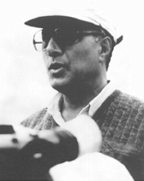go to WASHINGTON FREE PRESS HOME (subscribe, contacts, archives, latest, etc.)
Nov/Dec 2000 issue (#48)
|
|
The Wind Will Carry Us
Directed by Abbas Kiarostami
If you like to come away from a film with a clear-cut understanding, stay away from director Abbas Kiarostami's The Wind Will Carry Us. But if you're unfazed by poetic ambiguity, this just might be your movie.
Several men arrive in a remote village in Iranian Kurdistan. They wish to keep their purpose secret, but their leader, Behzad, takes great interest in the condition of an old woman near death. He keeps in touch with the outside world with his cell phone; whenever it rings, he jumps in his truck and heads for the highest place--which happens to be the cemetery. As anyone who has seen Kiarostami's Taste of Cherry or And Life Goes On can attest, the director is fascinated by images of vehicles climbing hills.

Urban Iran meets rural in Kiarostami's The Wind Will Carry Us, and both seem puzzled. |
The village is a world unto itself. Built into a hillside by "the ancestors," navigating through it involves passage up and down numerous stairways and ladders. Thus, Kiarostami gives us many shots looking straight down on people. The village and surrounding countryside are dominated by great swaths of yellow, green, and white, often making for stunning landscapes. In sound, the town manifests itself through barking dogs, bleating sheep, crowing roosters, cowbells, crying babies, and snippets of music.
Addressing him as "engineer," Behzad is greeted by the townspeople with considerable outward hospitality--especially on the part of a boy named Farzad. This engineer is an amiable guy, given to quoting poetry and good-natured sexual innuendo (quite a surprise in an Iranian film!) As our emissary into this unfamiliar territory, we naturally identify with him.
But through a stylistic device, Kiarostami suggests that something is wrong. Repeatedly, the engineer will be in a conversation with someone who hides her face, or is simply not in the frame of the shot: a man digging a hole, a girl milking a cow, his own colleagues. Significantly, even Farzad, after a falling-out with the engineer, is off-screen. Although Behzad communicates with these people, he remains isolated from them.
Much here is familiar from other Kiarostami works. Again we have adults too preoccupied to take a genuine interest in children, a story touching on filmmaking, an interest in death--and even, as in Taste of Cherry, in graves.
But what is it that's dying? It's certainly not the village, to which a new member is added in the course of the film. Is it something in the souls of city-folk who, no matter how high they go, have lost contact with fundamental realities?
The villagers are usually at work--even a mother, having given birth to her tenth child, is back at her chores the next day. An insect, pushing along an object many times its size, seems to mock the idleness of the engineer. When he pleas for forgiveness from Farzad, his excuse being that, like a truck that was pushed too hard, he had "given up the ghost," the boy reminds him that he hadn't been working at all. He can only respond that sometimes idleness too is hard. True enough.
Questions of good and evil keep coming up (including on one of Farzad's exams). So it's fitting when Behzad asks the boy: do you think I'm a good person? Whatever conflict between Behzad and the villagers simmers below the surface, he himself may feel a certain self-disgust.
I can't resist speculating that Behzad, an intruder bringing a camera into a remote village and photographing people against their wishes, represents a side of Kiarostami himself. Filmmaking inevitably involves a degree of manipulation--perhaps even exploitation. Kiarostami often incorporates documentary elements into his films, and favors using nonprofessional actors to "play themselves." Perhaps with this film, he's confronting some feelings of guilt.

Kiarostami's films often touch on filmmaking itself. |
If you leave a film saying "I don't get it," you may turn to a critic for help. Sorry, but in this case I'm unequal to the task. Ultimately, you're on your own, and Kiarostami wouldn't have it any other way. He says "When we reveal a film's world to the members of an audience, they each learn to create their own world through the wealth of their own experience. As a filmmaker, I rely on this creative intervention, for otherwise the film and the audience will die together. Faultless stories that work perfectly have one major defect: they work too well to allow the audience to intervene."
What's clear as day, though, is that we should think back on the poetry cited during the film--which takes its name from a line of verse. At the end, you too may find yourself heartily agreeing with one such admonition to distrust promises of glories to come, and instead "prefer the present."
|
go to WASHINGTON FREE PRESS HOME |